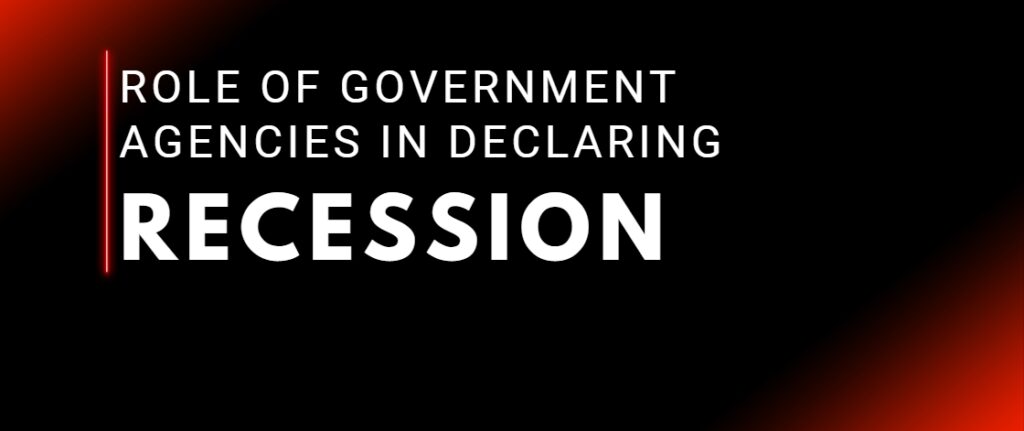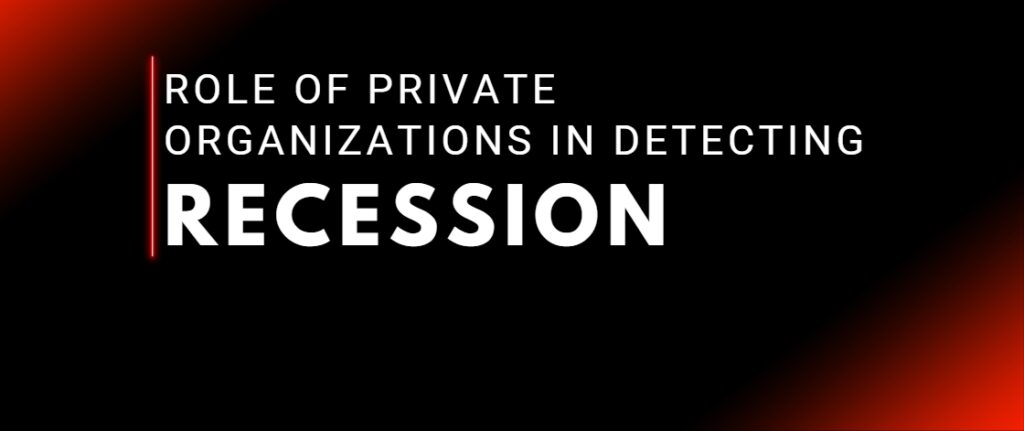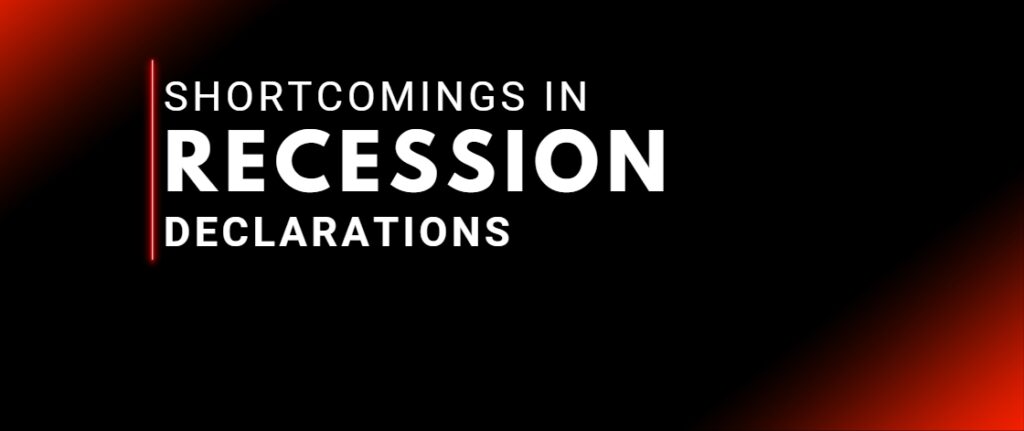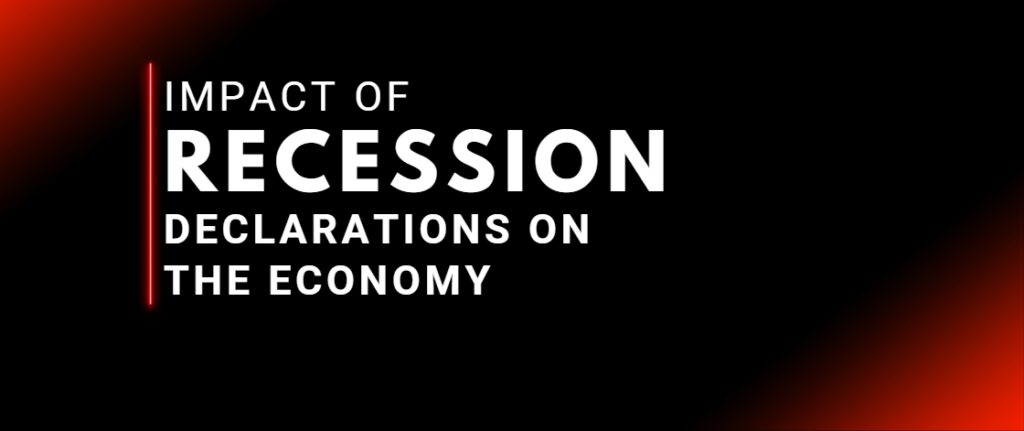The term recession comes from the Latin word’ recessus,’ which means ‘withdrawal’ or ‘retreat,’ and is often used to describe a general decline or setback.
A recession is a substantial and extended period of economic decline in which there is a drop in economic activity, such as a decrease in GDP, increased unemployment rates, lower consumer spending, decreased investment, and overall poor economic development.
A recession can have long-term economic consequences, typically taking years to recover from it, and can significantly impact individuals, businesses, and governments.
But who decides that it’s a recession?
In this blog, we will learn about the organization that officially declares a recession. We will also try to understand the process that economists follow and how they declare the beginning and end of a recession.
To start with, let’s discuss the agencies involved in declaring recession.
Role of Government Agencies in Declaring Recession

Rather than a single government, private agency, or organization, a group of economic experts typically declares a recession. Several government and corporate organizations play a crucial role in declaring a recession. One of the most prominent organizations that declare recessions is the National Bureau of Economic Research (NBER).
Following are the roles various agencies play in declaring a recession:
- Monitoring Economic Indicators– Government organizations such as the National Bureau of Economic Research (NBER) and the Bureau of Labor Statistics (BLS) keep a close eye on economic indicators such as GDP, employment rates, inflation rates, and consumer expenditure.
- Data Analysis- National Bureau of Economic Research (NBER) and Bureau of Labor Statistics (BLS) examine economic data and trends to evaluate whether there has been a significant drop in economic activity across the country, and they analyze the data accordingly.
- Detecting A Recession- NBER and BLS may declare a recession if there has been a considerable fall in economic activity. A recession is usually defined as two-quarters of negative GDP growth, and these organizations work on predicting & determining the same.
If you need some ideas about what to read next, here they are:
- Declaring A Recession- Once a recession has been determined, the agency will make the announcement public. This announcement has the potential to have a substantial influence on financial markets as well as consumer confidence.
- Offering Advice- Agencies may also offer advice on how to manage the recession, including recommendations for businesses and individuals on how to lessen the adverse effects of the economic slump.
- Revisions To The Declaration- Authorities may update their recession announcement whenever new data emerges. For example, if economic activity begins to improve, the agency may proclaim that the situation is improving.
As agencies are engaged in the process of declaring a recession, they play a crucial role in monitoring economic activity, analyzing data, and providing guidance so that individuals and businesses can navigate the economic downturn as effectively as possible.
Government agencies play all the above roles. Now, let’s find out the role of private agencies in declaring recessions.
Role of Private Organizations in Detecting Recession

Following are the roles of private organizations in detecting an approaching downturn:
- Data Collection And Analysis- Private organizations, such as think tanks and research firms, also collect and analyze economic data, providing insights into the state of the economy and potential indicators of a recession.
- Business Sentiment Surveys- Private organizations such as the National Federation of Independent Business (NFIB) conduct business sentiment surveys that provide insight into small businesses’ confidence in the economy. This can be an early indicator of a potential recession.
- Risk Assessment And Management- Private financial institutions such as banks and insurance companies play a critical role in assessing and managing economic risk. They may take actions such as increasing reserves or tightening lending standards to mitigate potential losses in the event of a recession.
- Investment And Lending- Private organizations such as banks, investors, and venture capitalists make decisions about where to invest and lend money, which can affect the overall health of the economy. For example, if they pull back on investment or lending during a recession, it can exacerbate the economic downturn.
- Public Relations And Communication- Private organizations may also play a role in communicating information about the economy to the public, as well as shaping public perception of the economy.
It’s worth noting that the role of private organizations in a recession can be complex and may depend on the specific actions taken by these organizations and the broader economic context.
But there is always controversy surrounding the global recession in every declaration, whether it is by a private or government organization. Let’s discuss the same next.
Shortcomings in Recession Declarations

When declaring a recession, a lot of issues or controversies might occur. Some of them are as follows:
- Timing- There can be disagreements over when a recession officially begins and ends. This is because there is often a lag between when economic conditions change and when official data is available to confirm the change. Additionally, the criteria used to define a recession, such as a decline in GDP, can be subject to interpretation.
- Political Considerations- Governments and central banks may be reluctant to declare a recession because of the potential political fallout. This can be particularly true for governments that are up for re-election, as a recession can be seen as a failure of economic policy.
- Impact on Markets- Declaring a recession can also have a negative impact on financial markets, as investors may become more risk-averse and sell off assets. This would make the market more volatile.
- Difficulty in Identifying the Cause of Recession- Many macroeconomic factors are at play in an economy, and it can be difficult to identify the specific cause of a recession. This can make it difficult to craft effective policy responses to a recession.
- Inaccuracy in Measuring Overall Economic Activity- It is often hard to measure the overall economic activity as there are many variables to consider. GDP data may not accurately reflect the well-being of a country’s citizens, especially in developing countries where a large proportion of economic activity takes place in the informal sector.
All the reasons mentioned above are from the controversies that happened during the declaration of the past recessions. It is also because there are no standard criteria for determining when a recession occurs; these may differ from country to country or within different sub-regions of a country.
Let’s take a look at how all of these pronouncements could affect the economy.
Impact of Recession Declaration on the Economy

Declaration of recession can impact the whole economy in the following ways:
- Decrease in Investment and Borrowing- When the recession is declared, businesses and consumers are less likely to invest in new projects or take out loans, as they become more risk-averse. This declaration could lead to a decrease in economic growth and an increase in defaults.
- Increase in Bankruptcies and Defaults- Recession declaration can lead to an increase in bankruptcies and defaults as businesses and individuals struggle to make payments on loans and other debts.
- Increase in Poverty and Inequality- The declaration of a recession can lead to a rise in poverty and inequality, as unemployment and decreased economic activity can disproportionately affect lower-income individuals and communities.
- Decline in Business and Consumer Spending- Consumers and companies tend to spend less money during a recession as they become more cautious and worried about the future. And after the declaration of recession, things could get worse.
Thus, these are the economic impacts of declaring a recession. In the final section, let us look at an investment alternative that can help you & your portfolio combat the recessionary pressure.
The Bottom Line
This blog explored the reasons behind the recession declaration from scratch. Starting from NBER and discussing its role in declaring this bad news called recession, we have discussed the role played by government and private-based organizations in detecting recession which is followed by discussing the shortcomings in declaring recession.
Declaring a recession is one thing, but preparing yourself for it is completely different. Multiple agencies can declare a recession, but your financial future can only be declared by you and the companies that you pick along the way. One such company that will assist you through the thick and thin of a downturn is Secvolt. Be it the results in terms of numbers or your legacy, this quant hedge fund serves its clientele with the best.
Join Our Newsletter
Elevate your financial game & join the ranks of elite investors with Secvolt’s exclusive newsletter.
Join Our Newsletter
Elevate your financial game & join the ranks of elite investors with Secvolt’s exclusive newsletter.
Don’t just dream of wealth; achieve it with Secvolt. Schedule a call today for personalized guidance on your investment strategy and join the ultra-successful.
Ready to unlock your wealth’s truest potential & cherish affluence?
Secvolt, our hedge fund, sets the bar high with a record-breaking performance of 262% returns in 2022. With the brilliance of our highly advanced quant models and the efficiency of our risk mitigation protocols, we are yet to see a loss!
We’re the perfect ally to help you succeed financially and build the lasting legacy you have always aspired for.
Get in touch today. YOUR LEGACY AWAITS YOU…






